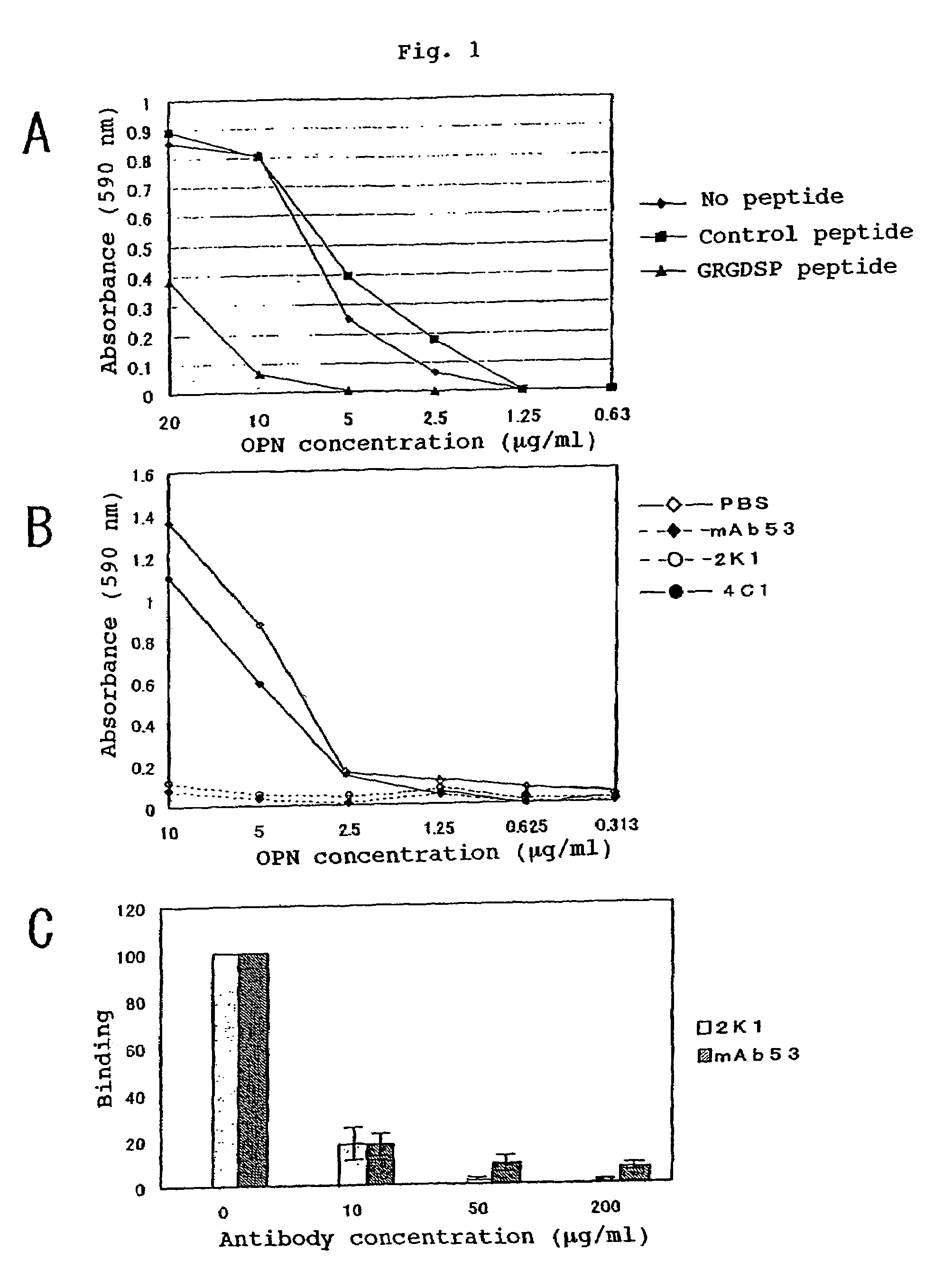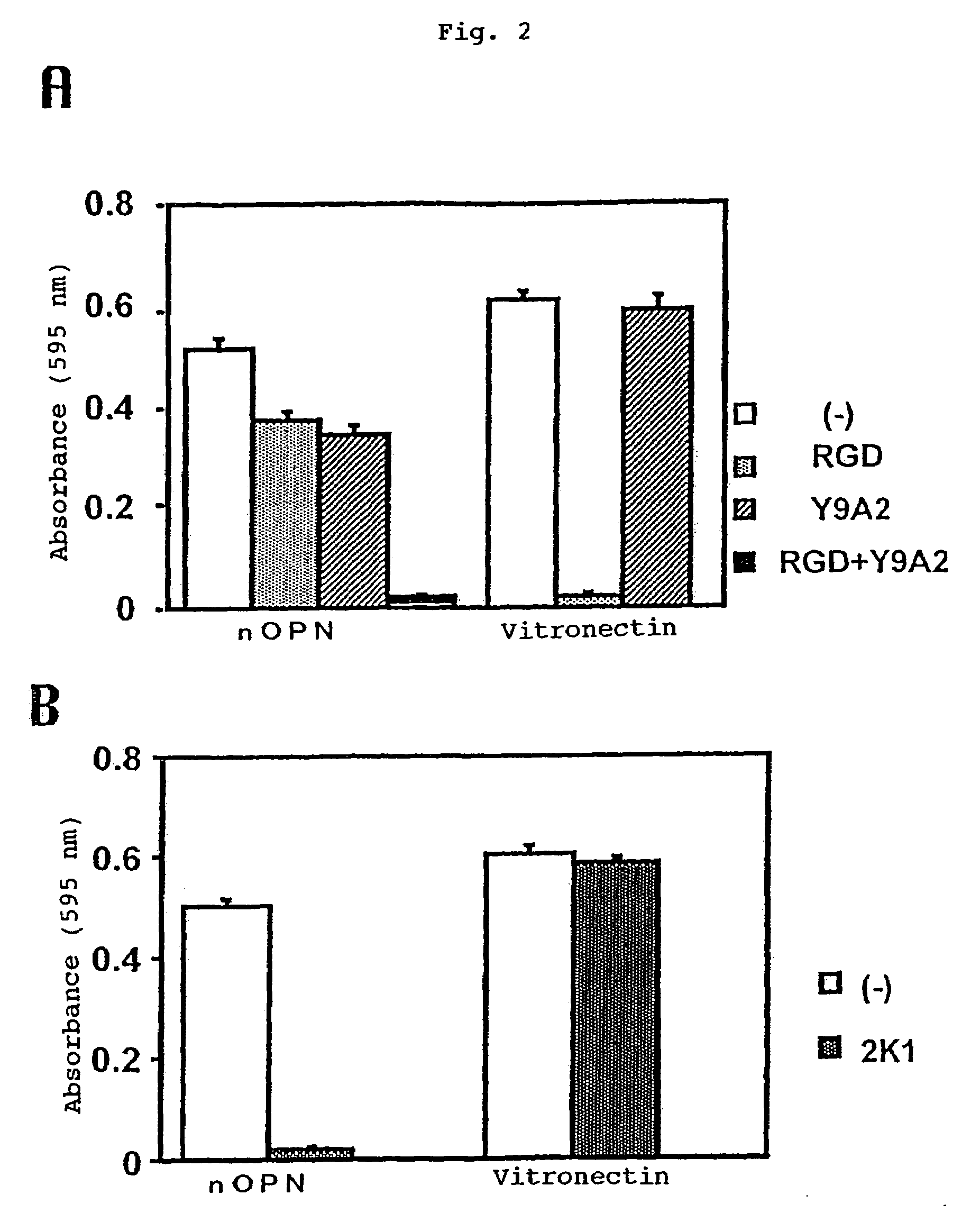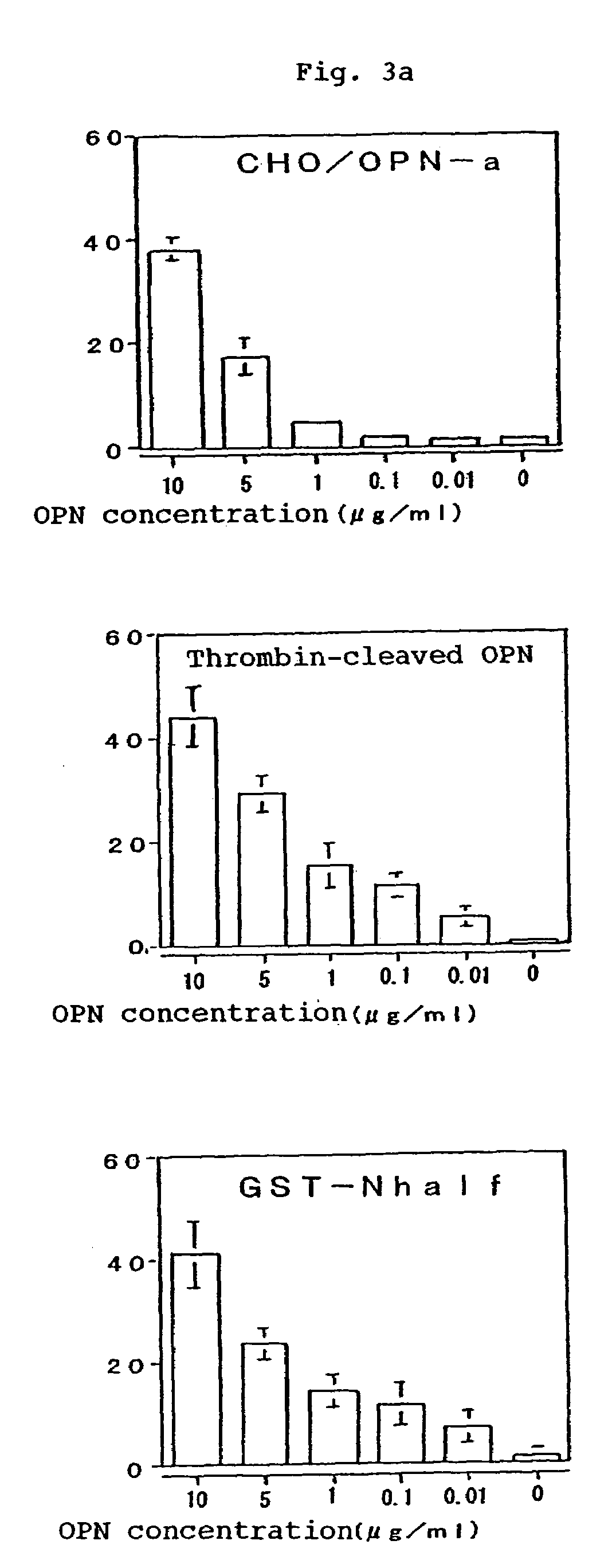Recombinant anti-osteopontin antibody and use thereof
a technology of osteopontin and antibody, which is applied in the direction of fused cells, drug compositions, immunological disorders, etc., can solve the problems of ineffective protein half-life reduction and murine antibody administration to humans, and achieve the effect of suppressing bone damag
- Summary
- Abstract
- Description
- Claims
- Application Information
AI Technical Summary
Benefits of technology
Problems solved by technology
Method used
Image
Examples
example 1
[0160]Cloning, Construction, Purification and Reagents for GST-OPN Fusion Protein:
[0161]Cloning and protein purification were done essentially according to the method described in the reference (S. Kon et al., (2000): J. Cell. Biochem. 77: 487–498).
[0162]The cDNAs of the human OPN isoforms i.e. OPN-a and OPN-b were recovered as follows. Using RNA prepared from NRC-12 cells of a human kidney cancer cell line as template, cDNA was synthetically prepared; using the cDNA as template, PCR was done using the following primers OPN-5 and OPN-3 to recover cDNAs encoding the full-length human OPN-a and OPN-b individually including the respective signal peptide regions.
[0163]In the manner as described in the reference, then, the thus cloned cDNAs of OPN-a and OPN-b were inserted in pGEX4T vector (Amersham Pharmacia Biotech, Tokyo, Japan) so that the cDNAs might be in the same reading frame as that of the GST gene (glutathione S-transferase; EC2.5.1.18), for expression in the form of GST fusion...
example 2
[0174]Production of Murine Monoclonal Antibodies:
[0175]Synthetic peptides corresponding to the inner sequences of human OPN were prepared, as shown below, which were then used for immunization.
[0176]
Peptide 1:CVDTYDGRGDSVVYGLRS (C + V153 to S169)Peptide 2:CIDSQELSKVSREFHSH (C + I261 to H276)
[0177]Specifically, the Peptide 1 has the sequences RGD and SVVYGLR (residues 11–17 of SEQ ID NO: 1) recognizing the αVβ3 and α9 μl integrin receptors, respectively.
[0178]These peptides were bound to thyroglobulin, which were then used for murine immunization according to a general method. Continuously, splenocytes were isolated from the immunized mice, which were then subjected to cell fusion with a murine myeloma cell P3-X63-Ag8-653, using polyethylene glycol. According to the method described in the reference (M. Kinebuchi et al., (1991): J. Immunol., 146, 3721–3728), a hybridoma reacting with each of the peptides used for the immunization was selected.
[0179]From mice immunized with the peptid...
example 3
[0180]Reactivity of OPN and Thrombin Digestion Products Thereof with the Murine Monoclonal Antibodies:
[0181]The binding potencies of the murine monoclonal antibodies 2K1 (referred to as “murine 2K1 antibody” hereinafter) and 4C1 recovered in the Example 2 to OPN and the thrombin digestion products thereof were tested by Western blotting method. It was found that the murine antibody 2K1 reacted with GST-OPN-a, GST-OPN-b, GST-OPN-c and GST-N half. It was found that the antibody 4C1 reacted with GST-OPN-a, GST-OPN-b, GST-OPN-c and GST-C half. Further, these monoclonal antibodies were not only bound to the recombinant OPNs of non-glycosylated type as generated in Escherichia coli but also reacted with the CHO / OPN-a protein of sugar-chain-bound type and the thrombin digestion products thereof (referred to as “thrombin-cleaved OPN” hereinafter).
PUM
| Property | Measurement | Unit |
|---|---|---|
| molecular weight | aaaaa | aaaaa |
| molecular weight | aaaaa | aaaaa |
| molecular weight | aaaaa | aaaaa |
Abstract
Description
Claims
Application Information
 Login to View More
Login to View More - R&D
- Intellectual Property
- Life Sciences
- Materials
- Tech Scout
- Unparalleled Data Quality
- Higher Quality Content
- 60% Fewer Hallucinations
Browse by: Latest US Patents, China's latest patents, Technical Efficacy Thesaurus, Application Domain, Technology Topic, Popular Technical Reports.
© 2025 PatSnap. All rights reserved.Legal|Privacy policy|Modern Slavery Act Transparency Statement|Sitemap|About US| Contact US: help@patsnap.com



